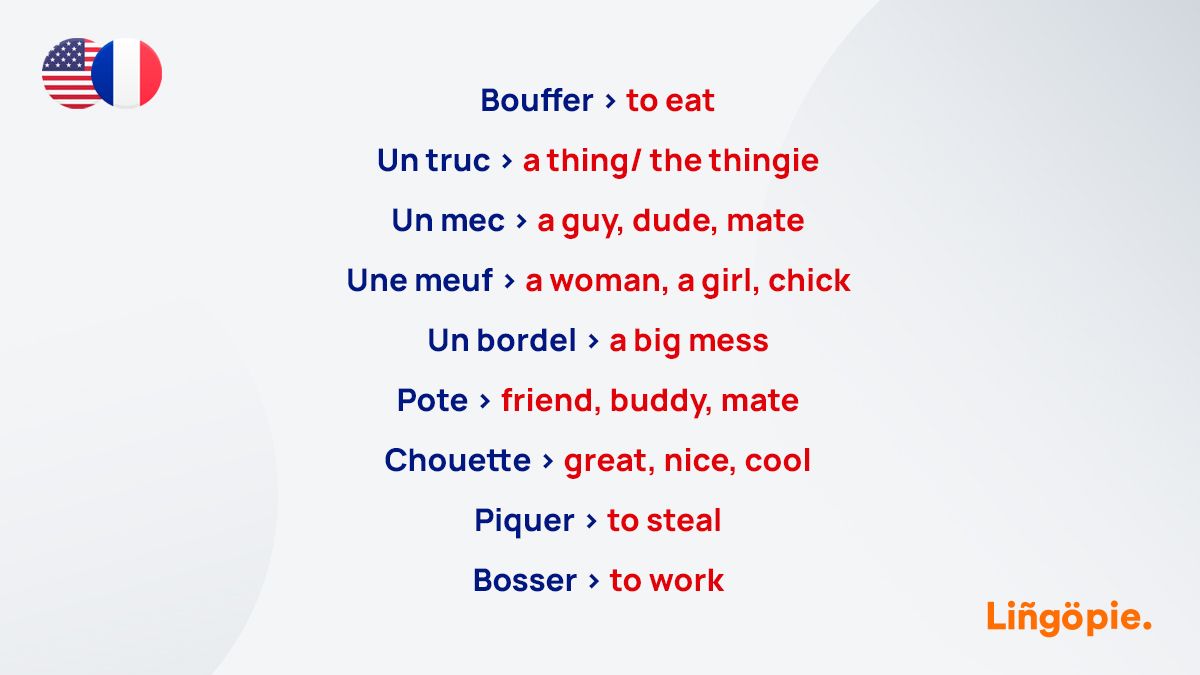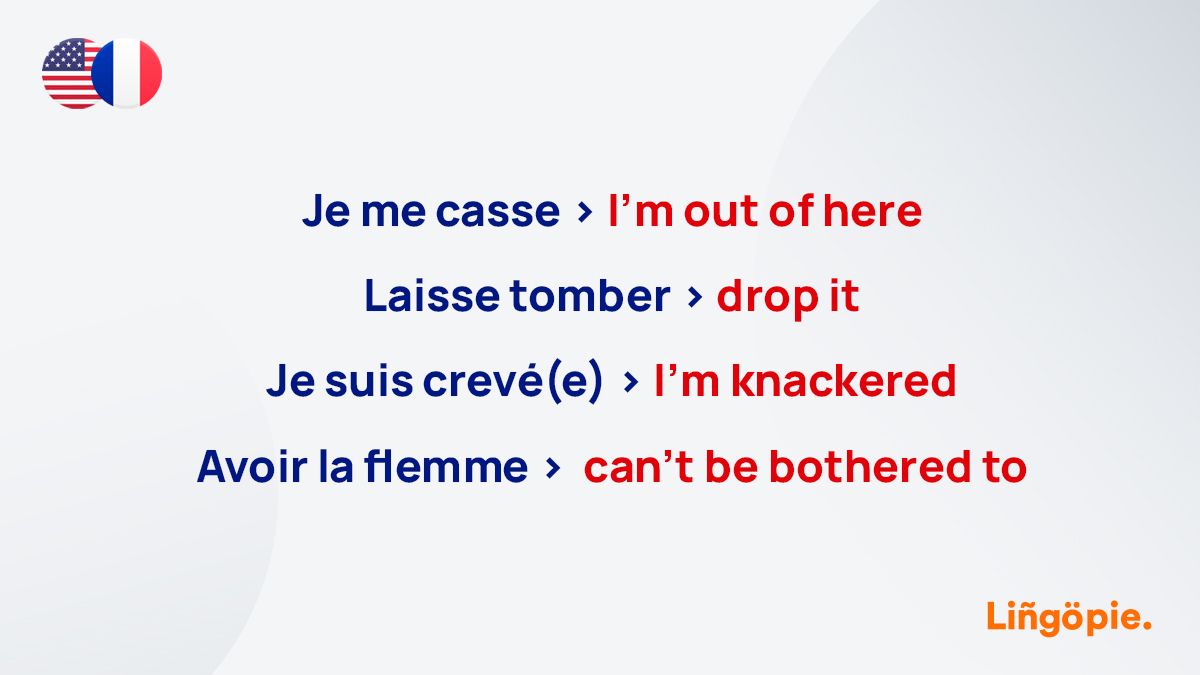French is one of the most beautiful languages in the world. I mean, we all dream of speaking French fluently, right? But the truth is, the French we learn at school and from textbooks doesn’t quite sound the same as the actual French spoken by natives. Why? Because native French speakers use a lot of slang (argot) in their daily conversations.
And if you want to start sounding like a French native, it’s important to focus on learning French slang phrases and add some popular slang phrases to your French learning. Thankfully, you don’t actually have to have an advanced level of French to learn new slang terms.
- 5 Easy Ways To Say Nice To Meet You In French
- 9 Best French Learning Websites You Must Benefit From
- How To Learn French With News In Slow French [Guide]

Why Learn French Slang?
Learning French slang is essential for anyone looking to improve French language skills and connect with native speakers. French slang words and phrases can help you sound more natural and fluent in your speech, making it easier to communicate with locals in France, Canada, or other French-speaking countries. Moreover, knowing French slang can help you avoid cultural faux pas and show respect for the language and its speakers.
By incorporating French slang into your vocabulary, you can:
- Improve your pronunciation and intonation
- Enhance your understanding of French culture and customs
- Connect with native speakers on a deeper level
- Avoid using overly formal or outdated language
- Sound more confident and proficient in your speech
Whether you’re a beginner or an advanced learner, learning French slang can take your language skills to the next level and make your interactions with native speakers more enjoyable and authentic.

Popular French Slang Words
1. Bouffer (to eat)
The verb bouffer is one of the French verbs used as slang to replace the actual verb for ‘eating’ in French, which is manger. However, bouffer gives a sense of eating excessively or even greedily. This word is used a lot by young people and teenagers.
Example: Je vais bouffer: I am going to eat.
You may also hear the term une bouffe which means ‘a meal’.
2. Un truc (a thing/ the thingie)
This word is used very frequently in daily French conversation. Un truc is simply an informal word for ‘a thing’ in French. It is usually used when talking about an object we can’t remember the name for (we do this in English, we say the thingie!).
We can also use this slang term when saying “That really isn’t my thing”. It is a really useful word to know.
Example: “Le foot, c’est pas mon truc!”. Football isn’t my thing.
3. Un mec (a guy, dude, mate)
This slang term is a simple and very handy one to memorize. Un mec refers to a person of the male gender. You can refer to your male friends as well as your boyfriend as your mec. It is similar to the word ‘bro’ in English.
4. Une meuf (a woman, a girl, chick)
This is the feminine version of un**mec. You can use une meuf to refer to a person of female gender or your girlfriend. Meuf actually sounds like the French word femme (woman) reversed, even though it is spelt differently. Cool!
5. Un bordel (a big mess)
If you translate this word literally, it means ‘a brothel’, but un bordel is commonly used as a slang term to mean ‘chaos’ or ‘a mess.’
You might hear this expression used a lot in France: Quel bordel! What a mess!
It can express something along the lines of ‘what a disaster!’ so don’t be surprised if you hear it grumbled or shouted negatively.
6. Pote (friend, buddy, mate)
The actual word for friend in French is ami/amie. Pote is the slang term used for referring to a close friend (either male or female). A variation for this word is poto. In English we use the term mate, which means the same thing.
Example: Roberto est mon meilleur pote. Roberto is my best friend.
7. Chouette (great, nice, cool)
As a noun itself, chouette is the word for owl in French. But as a slang term, you can use it to describe something you like or to say something or someone is cool.
Example: Mon prof est chouette. My teacher is cool.
C’est chouette! That’s great!
8. Piquer (to steal)
Piquer is the slang term for to steal something. It is often used to replace the actual term for stealing in French which is voler.
Example: Il m’a piqué mon portefeuille! He stole my wallet!
9. Bosser (to work)
The actual verb in French for ‘to work’ is travailler, but the informal term bosser is used a lot in French speaking countries. This one will be quite easy to remember as it contains the word ‘boss’ in English, so it should help you recall that it is work related.
There is a well-known French expression: bosser comme une dingue, which means to work your ass off!

Popular French Slang Phrases
Now that you’ve familiarized yourself with a few French slang words, here are a few useful slang phrases and expressions for you:
1. Je me casse (I’m out of here)
Funnily enough, if you literally translate Je me casse, it means ‘I break myself.’ But this expression is commonly used as a way of saying ‘i’m out of here’ when you decide to abruptly leave somewhere. It is useful for when someone has really annoyed you or you get fed up at a social event.
As a note of caution, you should only really use je me casse with your closest friends, as it can come across as quite harsh. Please don’t use it in the middle of a formal work meeting!
2. Arrête de te la péter (Stop showing off)
This playful phrase is used to tell someone to stop showing off or bragging. It’s a casual way to give a friendly reprimand among friends.
3. Laisse tomber (drop it)
If somebody ever tells you to laisse tomber, they are telling you to ‘let it go’ or to ‘drop the conversation.’ It is a bit like ‘never mind’ in English.
Sometimes we try to explain something, but the other person just doesn’t quite get it. If the topic isn’t that important anyway, this is the appropriate time to drop in a laisse tomber.
4. Je suis crevé(e) (I’m knackered)
Je suis crevé is a common slang expression which indicates exhaustion and feeling worn out.
Example: J’ai mal dormi. Je suis crevé. I slept badly. I’m exhausted.
5. Avoir la flemme (can’t be bothered to)
This is a common French slang expression that literally translates to “to have laziness”. It is a great phrase to use when you want to say you can’t be bothered to do something. However, don’t use it in formal work environments as it is probably too familiar for that.
If you want to politely say to someone that you don’t want to do something, stick to ‘je n’ai pas envie.’ (I don't want to).
6. Je te kiffe- i like you.
The term kiffer actually has Arabic origins and in English it would translate as: to like something, to be attracted or to take pleasure in something. This word is mostly used by French teenagers. If someone tells you je te kiffe they are saying they like you (but it doesn’t come across as seriously as je t’aime.)
You can use kiffe to talk about things you love. For example, je kiffe bien ton style (I really dig your style).
7. C’est n’importe quoi (it’s nonsense)
This is used a lot in daily French life. When someone says something silly or without substance, you can drop a c’est n’importe quoi. It basically means that’s nonsense, that’s absurd or that’s bullshit!
It can come across as quite dismissive towards the other person and what they are saying. Almost like a ‘whatever!’
Example: Tu dis n’importe quoi! You’re talking nonsense!

Expressing Emotions with French Slang
French slang is a powerful tool for expressing emotions and adding flavor to your language. From expressing excitement and enthusiasm to conveying frustration and annoyance, French slang words and phrases can help you convey your emotions in a more nuanced and authentic way.
For example, you can use the phrase “C’est chouette” to express excitement or enthusiasm, while “C’est n’importe quoi” can be used to convey frustration or annoyance. Other phrases like “Je te kiffe” can be used to express affection or admiration, while “Mort de rire” (often abbreviated as MDR) can be used to describe something that is hilarious or laugh-out-loud funny.
By learning French slang, you can add depth and emotion to your language, making it more engaging and relatable to native speakers.
- Dr. Mrs. Vandertramp Verbs: 3 Easy Tricks For Beginners
- Is Spanish easier than French to Learn?
- 100+ Basic French Words: Essential Guide for Beginners
Tips for Mastering Slang Words and Phrases
Mastering French slang words and phrases requires practice, patience, and dedication. Here are some tips to help you get started:
- Listen to native speakers: Pay attention to how native speakers use slang in their everyday conversations. This will help you understand the context and nuances of different slang terms.
- Watch French movies and TV shows: Watching recent French-speaking movies and TV shows can help you learn new slang words and phrases. Pay attention to the dialogue and try to pick up on the slang used by the characters.
- Practice with language exchange partners: Find a language exchange partner or tutor who can help you practice using slang in context. This will give you the opportunity to use slang in real conversations and get feedback on your usage.
- Use language learning apps: There are many language learning apps that offer French slang lessons and exercises. These can be a great way to learn new slang words and phrases and practice using them in different contexts.
- Read French books and articles: Reading French books and articles can help you learn new slang words and phrases in context. Look for contemporary literature or online articles that use modern slang.
Remember, mastering French slang takes time and practice. Don’t be afraid to make mistakes – keep practicing, and you’ll get there eventually!
Frequently Asked Questions about French Slangs
How do you say cool in French slang?
In French slang, "cool" is often expressed as "chouette" or simply "cool," similar to English. Another popular term is "trop bien."
True or false: you can easily translate slang expressions word-for-word from English to French?
False. Slang expressions often have cultural nuances and context that don't translate directly. It's best to learn slang in context to understand its proper use.
What are some of the most common French slang words?
Common French slang words include:
- "Bagnole" (car)
- "Boulot" (job)
- "Fringues" (clothes)
- "Mec" (guy)
- "Nana" (girl)
- "Kiffer" (to like/love)
What are some slang words or phrases that are exclusive to French Canadians?
Exclusive French Canadian slang includes:
- "Char" (car)
- "Magasiner" (to shop)
- "Déjeuner" (breakfast, differs from standard French where it means lunch)
- "Jaser" (to chat)
- "C'est de valeur" (that's too bad)
Which French Slang Is Your Favorite?
So, how many of these expressions will you be able to memorize? Do you have a personal favorite? Remember that you don’t need to learn every single slang term out there. Simply slipping a few into your phrases is enough to sound a bit more French.
Don’t forget that watching movies and series in French is a worthwhile way to pick up slang expressions. You will also be able to hear how the words are correctly pronounced. Why not have a look at our large French selection of TV shows, including your favorite Netflix series, on Lingopie?
If you have a Netflix account you should also check out our list of the best 12 tv shows on Netlix to learn French and if you feel in need of a laugh we also have this awesome list of our best comedies in French.
With a good grasp of slang expressions, you will find it easier to make French friends, your language learning journey will be a lot more fun and best of all, you will sound a lot more like a French local.
Bonne chance!


![15 French Slang Phrases and Words You Need to Know [Language Tips]](/blog/content/images/size/w1200/2022/10/15-French-Slang-Words-and-Phrases-You-Need-to-Know.webp)






